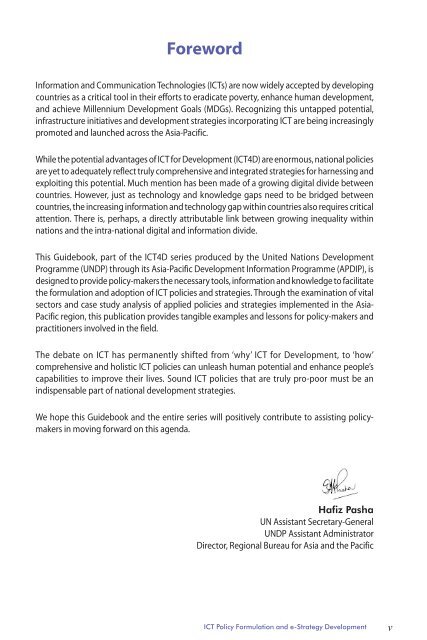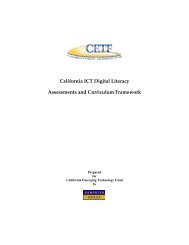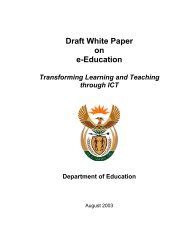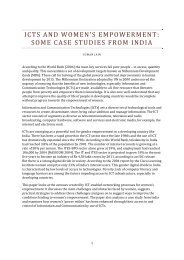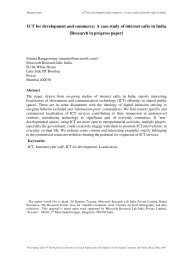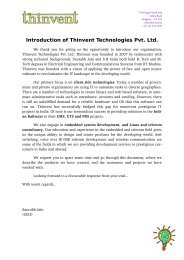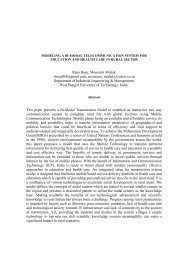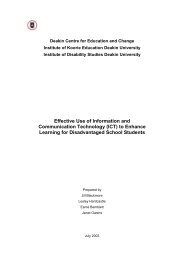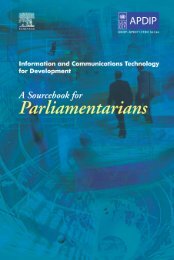ICT Policy Formulation and e-Strategy Development: A ... - un-apcict
ICT Policy Formulation and e-Strategy Development: A ... - un-apcict
ICT Policy Formulation and e-Strategy Development: A ... - un-apcict
Create successful ePaper yourself
Turn your PDF publications into a flip-book with our unique Google optimized e-Paper software.
Foreword<br />
Information <strong>and</strong> Comm<strong>un</strong>ication Technologies (<strong>ICT</strong>s) are now widely accepted by developing<br />
co<strong>un</strong>tries as a critical tool in their efforts to eradicate poverty, enhance human development,<br />
<strong>and</strong> achieve Millennium <strong>Development</strong> Goals (MDGs). Recognizing this <strong>un</strong>tapped potential,<br />
infrastructure initiatives <strong>and</strong> development strategies incorporating <strong>ICT</strong> are being increasingly<br />
promoted <strong>and</strong> la<strong>un</strong>ched across the Asia-Pacific.<br />
While the potential advantages of <strong>ICT</strong> for <strong>Development</strong> (<strong>ICT</strong>4D) are enormous, national policies<br />
are yet to adequately reflect truly comprehensive <strong>and</strong> integrated strategies for harnessing <strong>and</strong><br />
exploiting this potential. Much mention has been made of a growing digital divide between<br />
co<strong>un</strong>tries. However, just as technology <strong>and</strong> knowledge gaps need to be bridged between<br />
co<strong>un</strong>tries, the increasing information <strong>and</strong> technology gap within co<strong>un</strong>tries also requires critical<br />
attention. There is, perhaps, a directly attributable link between growing inequality within<br />
nations <strong>and</strong> the intra-national digital <strong>and</strong> information divide.<br />
This Guidebook, part of the <strong>ICT</strong>4D series produced by the United Nations <strong>Development</strong><br />
Programme (UNDP) through its Asia-Pacific <strong>Development</strong> Information Programme (APDIP), is<br />
designed to provide policy-makers the necessary tools, information <strong>and</strong> knowledge to facilitate<br />
the formulation <strong>and</strong> adoption of <strong>ICT</strong> policies <strong>and</strong> strategies. Through the examination of vital<br />
sectors <strong>and</strong> case study analysis of applied policies <strong>and</strong> strategies implemented in the Asia-<br />
Pacific region, this publication provides tangible examples <strong>and</strong> lessons for policy-makers <strong>and</strong><br />
practitioners involved in the field.<br />
The debate on <strong>ICT</strong> has permanently shifted from ‘why’ <strong>ICT</strong> for <strong>Development</strong>, to ‘how’<br />
comprehensive <strong>and</strong> holistic <strong>ICT</strong> policies can <strong>un</strong>leash human potential <strong>and</strong> enhance people’s<br />
capabilities to improve their lives. So<strong>un</strong>d <strong>ICT</strong> policies that are truly pro-poor must be an<br />
indispensable part of national development strategies.<br />
We hope this Guidebook <strong>and</strong> the entire series will positively contribute to assisting policymakers<br />
in moving forward on this agenda.<br />
Hafiz Pasha<br />
UN Assistant Secretary-General<br />
UNDP Assistant Administrator<br />
Director, Regional Bureau for Asia <strong>and</strong> the Pacific<br />
<strong>ICT</strong> <strong>Policy</strong> <strong>Formulation</strong> <strong>and</strong> e-<strong>Strategy</strong> <strong>Development</strong><br />
v


